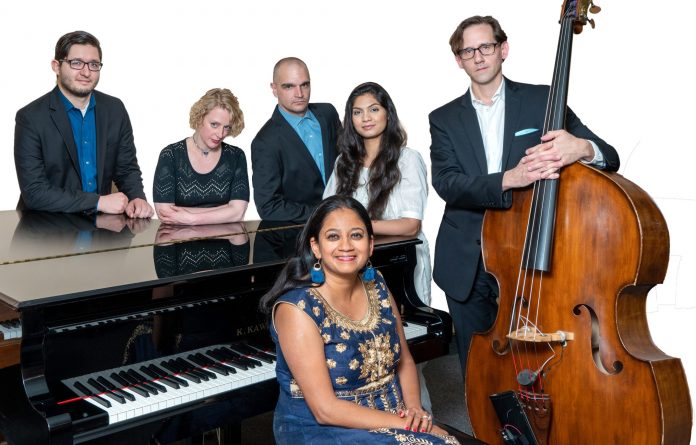Standing at the intersection of jazz and Islamic Sufi music is Charu Suri.
Born in Madurai, India, Suri began learning the piano at age of 5. By age 15, she’d won an international piano competition.
Suri says her love and feel for music inspired her to continue playing piano.
“I just love music, it was basically everything that kept me going,” Suri said. “It was the vehicle that kept me inspired and motivated.”
Suri said music brings her comfort when she needs it. She always turned to music when she had a bad day.
“It was the one thing in my life from a very, very early age that made sense to me.” Suri recalled. “It was the only thing that made complete sense.”
To attend Princeton University, Suri moved to New Jersey, settling in Weehawken. At Princeton, she composed several pieces for orchestra and chamber orchestra, but never recorded commercially until recently.
From the classics to jazz and Sufi
While Suri has been a pianist for most of her life, she didn’t always play jazz. Trained as a classical pianist, Suri recalls her natural transition into jazz followed by her jazz-sufi music fusion.
Her sound came from longing to do something more modal. For most of her career, Suri had been playing western classical harmonic music using tonal music.
“I wanted to create something more modal because it was very nostalgic, more ancient sounding, and I love the ancient sounds,” Suri said. “I majored in the classics in college and also did music, so I’ve always been drawn to history and to historical sounds.”

“The use of the raga scales to create jazz work was something that has been on my mind since I listened to the modal experiments of Miles Davis,” Suri said, referring to the albums “Kind of Blue” and “Bitches Brew” by Davis.
Suri said her musical inspirations beyond Davis include Bill Evans and Dave Brubeck. She describes them as her triumvirate of inspiration, alongside Oscar Peterson and Canadian pianist Kris Davis.
These jazz artists, in addition to her Carnatic music upbringing in India, laid the groundwork for Suri to breakthrough into jazz-Sufi fusion music. Carnatic music is a style native to southern India that focuses on voice, with instruments mimicking singing.
“I discovered [Peterson’s] work fairly late because I wasn’t a jazz musician,” Suri said. “I was a classical musician, and I just fell in love with his virtuosity because I’m a virtuoso performer on the piano, or I like to think I am. But he made everything make sense; it wasn’t too over the top, but just right.”
Suri’s first album, “Lollipops for Breakfast,” was scored for a traditional jazz trio and won a Global Music Award. Her next traditional jazz album, “The New American Songbook,” has been well received, Suri said.
The album, featuring vocals by Danielle Erin Rhodes, focuses on traditional jazz. Suri said she’s always loved Ella Fitzgerald and Billie Holiday.
Then Suri met Apoorva Mugdal, her vocal counterpart throughout the album “The Book of Ragas.” The duo connected through a gig, and Suri discovered that Mugdal was a specialist in ghazals, or Arabic poems, and Sufi music. This is where Suri began her journey into newer, fresher jazz.
Sufi music is traditional devotional prayer music based on Sufi Islam and its poems. Suri had heard of the music, but never thought it was possible to create jazz using it.
“The journey of ‘The Book of Ragas’ was one of discovery,” said Mudgal, who chose the text and improvised sargams based on the musical framework. A sargam is when a vocalist sings a musical note instead of the words of a composition.
Suri said her favorite piece so far in her career is from “The Book of Ragas.” The composition is titled Raag Kalyani, featuring guest guitarist David Ellenbogen.
In Indian translation, Suri explained that Kalyani means “Queen of Indian ragas.” Kalyani inspired the piece “Raag Kalyani,” written in response to the quiet beauty of the countryside, with the sounds evoking a deep sense of calm and peace.
The poetry is “Ae Ri Aali,” a traditional bandish, or composition whose lyricist is not known. It embodies the yearning for the beloved in this surreal peace-inducing raga.

“It’s very, very peaceful because the core of Carnatic music and Hindustani music is to find that peace.” Suri said of the composition. “When you listen to the ‘Raag Kalyani,’ just at the end after finishing it, you are so at one with yourself. It’s a momentous journey from the beginning to the end. That raga is what people turn to for the ultimate experience or for peace.”
The album artwork was created by Upasana Asrani, an abstract artist based in Chennai, India. A friend of Suri, Arsani’s works are a reflection of a journey of self-discovery expressed throughout “The Book of Ragas.”
“The album artwork has been receiving a lot of praise, and that has been done by my longtime high school friend, who is an amazing artist herself,” Suri said. “I think she nailed the moods of the ragas in the cover. My other friends who have seen it say that they are getting the spirit and the vibe of India just from the cover.”
Making history at Carnegie Hall
Suri became one of the first Indian-American women to premier at Carnegie Hall with her double bill “Book of Ragas” and “The New American Songbook.”
“First of all, to perform at Carnegie Hall is a dream,” Suri said, describing the surreal nature of her performance. “But to perform one’s own music at Carnegie Hall is sensational.”
She hopes to inspire other jazz musicians to follow their passion and pursue their dreams through her performance.
“A couple of people have written me and said this is just a wonderful inspiration,” Suri said. “I think jazz in India is definitely taking off, but it’s very hard to find female composers and female jazz artists in India. I didn’t know of any growing up. Maybe it’s my own ignorance, or maybe this will inspire more women.”
Suri said that she and her band received a standing ovation, demonstrating that the audience enjoyed the show as much as she enjoyed performing.
“Honestly, [it was] a thrilling experience,” Suri said. “It’s very intimate. Weill [Recital Hall] is perfect for jazz. I felt completely connected to the piano, and to the audience. It was very freeing and not stuffy, and the Steinway concert grand there gets tuned daily, so the tones were velvety and perfect.”
During the show, Suri said that she was trying to just have fun, noting that she didn’t want her performance to feel like a “stuffy experience.”
“For me, it was the best stage I’ve performed on, and a lot of audience members felt the same way,” Suri said. “You can hear just about everything. My band was really thrilled to play on that stage.”
2020 World Tour
Next stop, India.
Suri said she plans on taking her music home during a potential 2020 tour, first making stops in Miami for Valentine’s Day as well as Chicago.
“We’re looking at September for a tour to India,” Suri said. “Right now it’s tentative, but we are looking at Delhi, Mumbai, and Bangalore which are great music cities. We 1000 percent are going to tour India and take our albums, ‘The Book of Ragas’ and ‘The New American Songbook’ on the road.”
For updates on this and other stories, check www.hudsonreporter.com and follow us on Twitter @hudson_reporter. Dan Israel can be reached at disrael@hudsonreporter.com.








![Best Jersey City Restaurants [current_date format=’Y’]: Which NJ Restaurants Live Up to the Hype?](https://staging.hudsonreporter.com/wp-content/uploads/2024/06/Jersey-City-Restaurants-324x160.jpg)



![Best Bitcoin Casinos in [current_date format=’Y’] – Top 10 Crypto Casino Sites for BTC Games Bitcoin Casinos](https://staging.hudsonreporter.com/wp-content/uploads/2024/01/bitcoin-casinos-feature-324x235.jpg)
![[current_date format=’Y’]’s Best Bitcoin eSports Betting Sites – Where to Bet on eSports with Crypto bitcoin esports betting](https://staging.hudsonreporter.com/wp-content/uploads/2023/12/bitcoin-esports-betting-sites-1-100x70.jpg)
![Best Bitcoin Casinos in [current_date format=’Y’] – Top 12 Crypto Casino Sites for BTC Bonuses Bitcoin Casinos](https://staging.hudsonreporter.com/wp-content/uploads/2024/01/bitcoin-casinos-feature-100x70.jpg)
![Best Ethereum Casino Sites – Top 10 ETH Gambling Sites with Fast Payouts [[current_date format=’Y’] Update] ethereum casinos](https://staging.hudsonreporter.com/wp-content/uploads/2023/09/ethereum-casinos-100x70.jpg)
![Best Dogecoin Casinos for [current_date format=’Y’] – Top DOGE Gambling Websites for Fast Payouts [Updated] dogecoin casinos](https://staging.hudsonreporter.com/wp-content/uploads/2023/06/dogecoin-casinos-feature-100x70.jpg)
![Best Bitcoin Casinos in [current_date format=’Y’] – Top 10 Crypto Casino Sites for BTC Games Bitcoin Casinos](https://staging.hudsonreporter.com/wp-content/uploads/2024/01/bitcoin-casinos-feature-324x160.jpg)
![[current_date format=’Y’]’s Best Bitcoin eSports Betting Sites – Where to Bet on eSports with Crypto bitcoin esports betting](https://staging.hudsonreporter.com/wp-content/uploads/2023/12/bitcoin-esports-betting-sites-1-324x160.jpg)
![Best Ethereum Casino Sites – Top 10 ETH Gambling Sites with Fast Payouts [[current_date format=’Y’] Update] ethereum casinos](https://staging.hudsonreporter.com/wp-content/uploads/2023/09/ethereum-casinos-324x160.jpg)
![Best Dogecoin Casinos for [current_date format=’Y’] – Top DOGE Gambling Websites for Fast Payouts [Updated] dogecoin casinos](https://staging.hudsonreporter.com/wp-content/uploads/2023/06/dogecoin-casinos-feature-324x160.jpg)
![Best Ontario Sports Betting Sites – Top ON Legal Sportsbooks Online ([current_date format=’Y’]) Ontario Sports Betting](https://staging.hudsonreporter.com/wp-content/uploads/2024/04/Ontario-Sports-Betting-324x160.jpg)
![[current_date format=’Y’]’s Best Illinois Sports Betting Sites: Top 10 IL Online Sportsbooks [Updated] Illinois Sports Betting](https://staging.hudsonreporter.com/wp-content/uploads/2024/04/illinois-sports-betting-1-324x160.jpg)
![Best Betting Sites Not on BetStop Australia: Top Non-BetStop Bookies for Aussies [[current_date format=’Y’] Update] Betting Sites Not on Betstop](https://staging.hudsonreporter.com/wp-content/uploads/2024/04/Betting-Sites-Not-on-Betstop-324x160.jpg)
![Best Sports Betting Sites Georgia – Top 10 GA Online Sportsbooks [[current_date format=’F Y’] Update] Georgia Sports Betting](https://staging.hudsonreporter.com/wp-content/uploads/2023/11/Georgia-Sports-Betting--324x160.jpg)
![Euro [current_date format=’Y’] Betting Odds – Top Winner Odds for the UEFA European Cup, UK Edition [Update] euto 2024 odds](https://staging.hudsonreporter.com/wp-content/uploads/2024/04/euto-2024-odds-324x160.jpg)